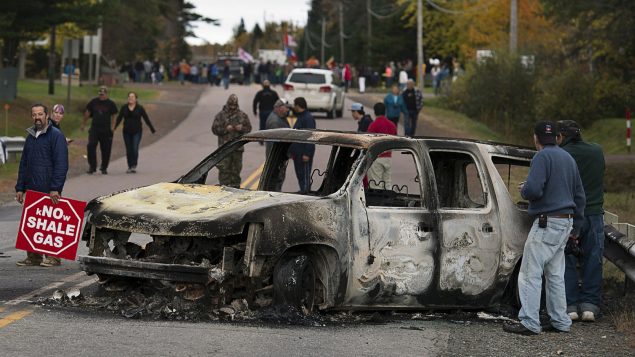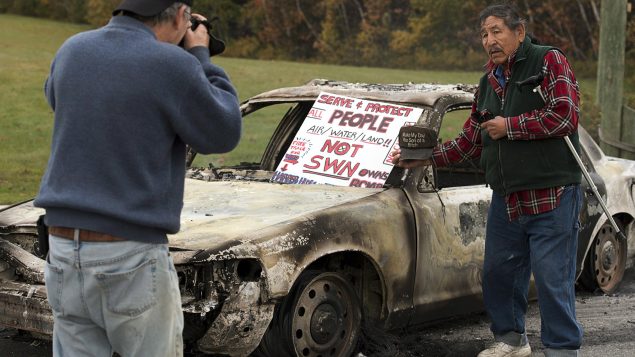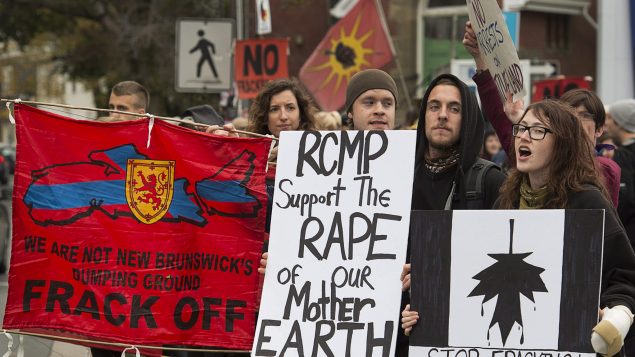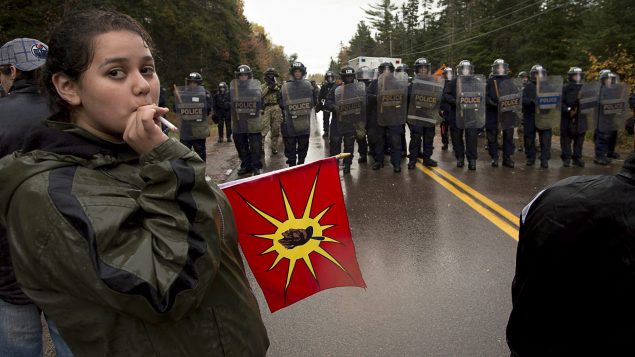A long-awaited report has some sharp words about the way the RCMP handled anti-fracking protests in the summer and fall of 2013 in New Brunswick.
The protests–near the town of Rexton and the Elsipogtog First Nation reserve in Kent County, as well as in various other parts of the province–drew national attention after they ended in a violent confrontation between protesters and the country’s national police force.
Following a summer of sporadic sparring between protesters and workers and a series of road closings, the RCMP–acting on a court-ordered injunction–moved in to clear an encampment occupied by protesters on Oct 17.

A police vehicle is seen in Rexton as police began enforcing an injunction to end an ongoing demonstration against shale gas exploration in the area on Thursday, Oct.17, 2013. (THE CANADIAN PRESS/Andrew Vaughan)
According to the Globe and Mail’s Gloria Galloway and Jane Taber, the situation “exploded in violence, sending dozens of people to jail and reducing five police cars to smouldering ruins.”
Today, the Civilian Review and Complaints Commission for the RCMP released its report on the confrontation and its leadup.

Protesters take photos of a burned out police vehicle in Rexton as police began enforcing the injunction to end an ongoing demonstration against shale gas exploration, on Thursday, Oct.17, 2013. Police said at least five RCMP vehicles were destroyed after they were set ablaze. (THE CANADIAN PRESS/Andrew Vaughan)
Among other things, the report says that a primary motivation for Indigenous protesters opposing the fracking was their dedication to protecting land and water they considered their own, unceded to the Crown through treaty or other agreement.
The report notes many officers acted reasonably, but it points to deep-seated concerns with the way Mounties gather intelligence, restrict individuals’ movement during protests and approach Indigenous culture.
CP’s Jim Bronskill reports that the commission found considerable evidence that RCMP members “understood and applied a measured approach” in planning their operations and while interacting with protesters.
However, Bronskill writes, it also found problems.

Demonstrators rally against shale gas exploration in Halifax on Friday, Oct.18, 2013 after the confrontation between anti-fracking protesters and the RCMP near the Elsipogtog First Nation in eastern New Brunswick, near Rexton. (THE CANADIAN PRESS/Andrew Vaughan)
“Several incidents or practices interfered to varying degrees with the protesters’ rights to freedom of expression, association and peaceful assembly,” the commission concluded.
The commission also found that some of the RCMP’s surveillance practices and physical searches were “inconsistent with protesters’ charter rights to be free from unreasonable search and seizure.”
The commission launched its investigation after receiving more than 21 complaints and examined a six-month span from June to Dec. 2013–reviewing thousands of files, video and documentary evidence and speaking to more than 100 witnesses.
“Canada’s ongoing reconciliation with Indigenous people includes protecting the rights of those whose voices have been diminished by systemic sources of racism in our society,” said commission chairwoman Michelaine Lahaie in a statement accompanying the report.
The full report can be read here.
With files from The Canadian Press (Jim Bronskill), CBC News (Catharine Tunney)







For reasons beyond our control, and for an undetermined period of time, our comment section is now closed. However, our social networks remain open to your contributions.